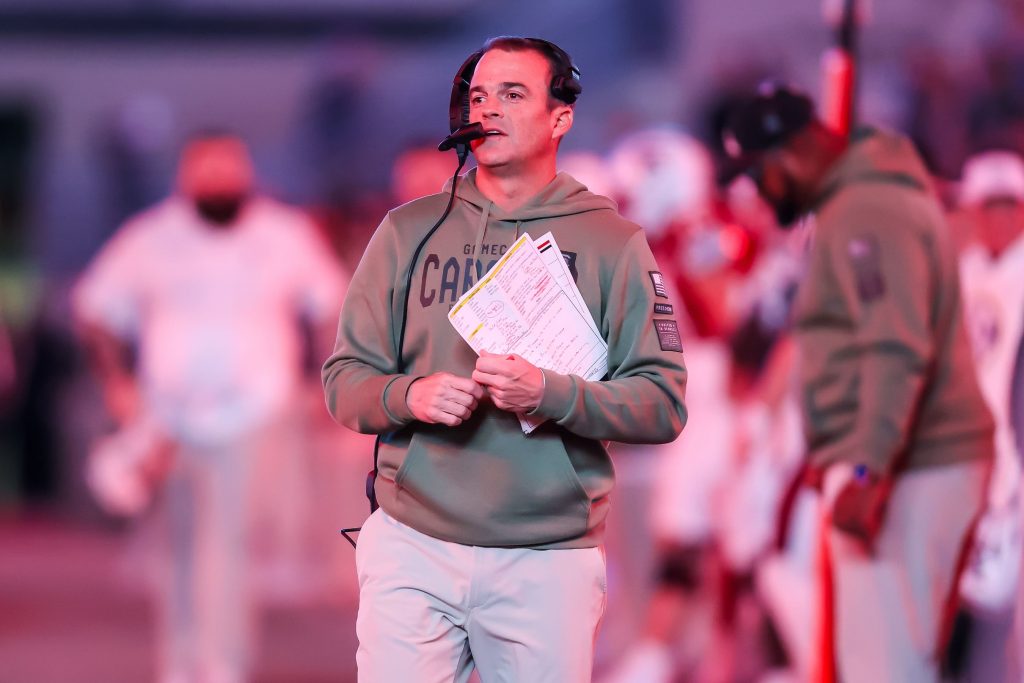If there’s one thing that sets the NFL apart, it’s its structured approach. From determining playoff teams to scheduling games and even selecting the draft order, everything is laid out in a clear and systematic manner. This stands in stark contrast to the college football landscape, particularly the College Football Playoff (CFP), where subjectivity often reigns supreme.
Spurrier’s Call for Clarity
Legendary head coach Steve Spurrier recently weighed in on the complexities of the CFP, advocating for a more straightforward method to determine which teams make the cut. He pointed out the efficiency of the NFL’s system, where the worst-performing teams are awarded the top draft picks based on a defined set of criteria. “I think there was four teams that finished [3-14]… What are they going to do, flip a coin? No,” Spurrier explained, emphasizing the need for a format that removes ambiguity.
Spurrier’s perspective is compelling. He argues that in college football, the selection committee often resorts to subjective judgments, saying, “Let’s give the first pick to New England, let’s give first pick to this team.” He believes that a transparent, mathematical approach would eliminate the debates that often arise in college football, where teams rarely face each other during the regular season.
The Current State of the College Football Playoff
This season, only five teams were guaranteed a spot in the College Football Playoff: Oregon (Big Ten), Georgia (SEC), Boise State (Mountain West), Arizona State (Big 12), and Clemson (ACC). These teams earned automatic bids based on their conference championships, with no subjective judgment involved. This is a significant aspect of the CFP, as it provides a clear pathway for some teams, while leaving others to vie for at-large spots.
The remaining seven teams in the playoff were considered at-large selections, a process that has historically sparked heated debates among fans and analysts alike. For instance, many supporters from SEC Country felt their teams deserved a spot over others like Indiana. This ongoing contention highlights the need for a more straightforward selection process, one that Spurrier and many others believe could benefit the sport.
The Case for a Structured System
Imagine a world where the playoff field is determined by “simple terms.” No more arguing over who deserves a spot; the numbers would speak for themselves. Spurrier envisions a system where records and tiebreakers dictate playoff entries, similar to how the NFL operates. This would not only streamline the selection process but also enhance the overall integrity of college football.
The current system can feel convoluted, especially when teams from different conferences rarely compete against each other. This lack of direct comparison makes it challenging for the committee to assess team strength accurately. By adopting a more structured methodology, college football could mirror the NFL’s clarity, making it easier for fans to understand how teams qualify for the playoffs.
Why Structure Matters in College Football
Structure in college football is essential for several reasons. First and foremost, it fosters fairness. When teams know that their playoff fate hinges on objective criteria rather than subjective opinions, it levels the playing field. Fans want to see their teams rewarded for their hard work and performance, not left to the whims of a selection committee.
Moreover, a structured system would enhance fan engagement. Imagine the excitement of following a clear set of rules that dictate playoff entries. Fans would be more invested in the outcomes of games, knowing that every win or loss could directly impact their team’s chances of making the playoffs.
Looking Ahead
As the college football landscape continues to evolve, the call for a more structured playoff system grows louder. With influential voices like Spurrier advocating for change, it’s worth considering how the sport could benefit from a more transparent and objective approach.
The current system, while it has its merits, often leaves fans frustrated and confused. By implementing a clear, structured format, college football could not only improve its playoff selection process but also enhance the overall experience for everyone involved.
In the end, college football is about passion, competition, and the thrill of the game. A more structured playoff system could help preserve these elements while ensuring that the best teams truly have a chance to compete for the championship. As we look forward to the next season, the hope is that the voices calling for clarity and fairness will lead to meaningful changes in the College Football Playoff, making it a more exciting and equitable experience for all.





























